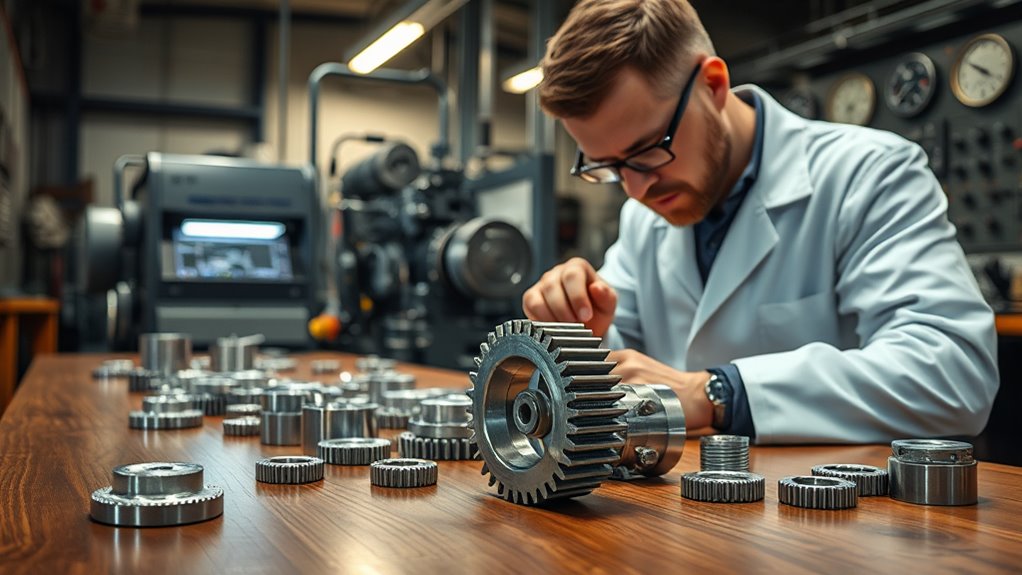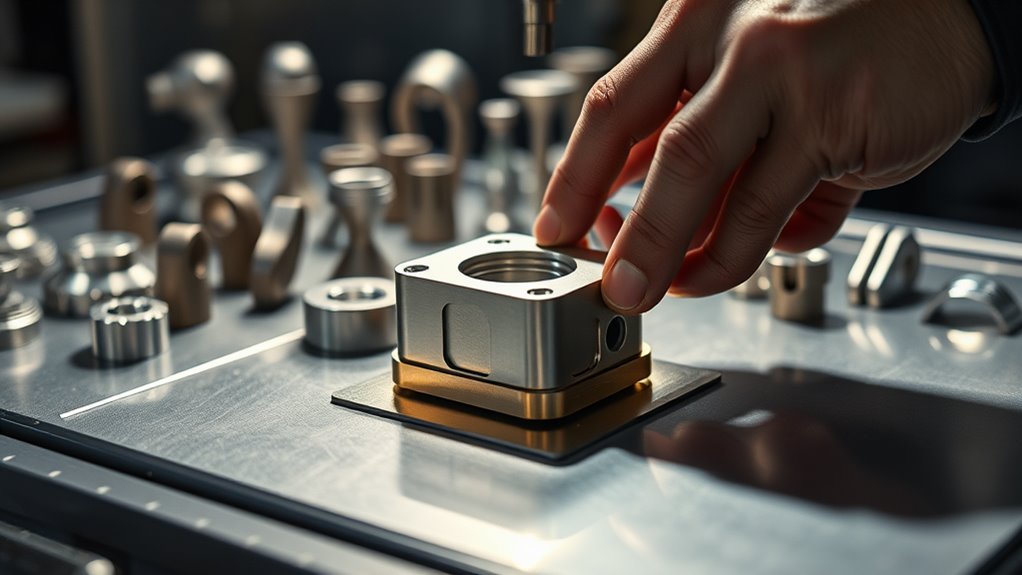Partnering with a precision parts manufacturer guarantees superior quality through advanced technologies and rigorous quality control processes. These manufacturers employ techniques like CNC machining and automated inspection to maintain strict adherence to specifications. Their capacity for customization allows for tailored solutions that optimize performance in various operational environments. Additionally, lean production methods reduce costs and minimize waste, reinforcing overall product integrity. Understanding these benefits reveals deeper insights into the advantages of such strategic partnerships.

The Importance of Precision in Manufacturing
Precision is consistently recognized as a critical factor in the manufacturing sector, where even the slightest deviation can compromise product integrity and operational efficiency. Adhering to strict design specifications is essential for achieving optimal performance and durability in manufactured components. Deviations from established engineering standards can lead to failures, resulting in costly recalls and damage to brand reputation. Consequently, the practice of precision manufacturing serves not only to meet the immediate requirements but also to uphold compliance with industry regulations. This meticulous approach enables manufacturers to guarantee that each component aligns with rigorous quality benchmarks, ultimately enhancing customer satisfaction. Precision in the manufacturing process therefore becomes indispensable for maintaining a competitive edge in a rapidly advancing market.
Advanced Technology and Techniques Used by Precision Parts Manufacturers
A precision parts manufacturer leverages innovative manufacturing processes and cutting-edge equipment to enhance operational efficiency and product accuracy. These advancements not only streamline production but also incorporate stringent quality control measures that guarantee compliance with industry standards. As technical demands evolve, the adoption of such technologies remains critical for maintaining competitiveness in the market.
Innovative Manufacturing Processes
Advanced manufacturing processes have transformed the landscape of precision parts production, integrating cutting-edge technologies and innovative techniques that enhance efficiency and accuracy. Central to this transformation are methods such as additive manufacturing and digital fabrication. Additive manufacturing, utilizing layered material deposition, allows for complex geometries that traditional methods struggle to achieve, thereby reducing material waste and lead times. Digital fabrication, characterized by computer-aided design (CAD) and sophisticated software, streamlines the design-to-production workflow, guaranteeing precision in every step. These innovative approaches not only guarantee superior quality and dimensional consistency but also enable rapid prototyping and customization, meeting the evolving demands of various industries. Using these advanced processes is vital for manufacturers aiming to maintain a competitive advantage in precision engineering.

Cutting-Edge Equipment Utilization
The adoption of cutting-edge equipment is pivotal in maximizing the benefits of innovative manufacturing processes in precision parts production. Advanced technology, particularly robotic automation, greatly enhances operational efficiency and accuracy. By integrating automated systems, manufacturers achieve ideal consistency in fabrication, reducing human error and minimizing variability. In addition, precision engineering techniques are leveraged alongside sophisticated CNC machines and additive manufacturing technologies to produce intricate components with exacting tolerances. This synergy between robotics and precision processes enables manufacturers to respond swiftly to dynamic market demands, ensuring scalability without compromising quality. Through ongoing investment in state-of-the-art equipment, precision parts manufacturers maintain a competitive edge, delivering products that meet stringent specifications with unparalleled reliability, additionally solidifying their reputation in the industry.
Quality Control Measures
Implementing robust quality control measures is essential for ensuring that precision parts meet the rigorous standards required by various industries. Precision parts manufacturers leverage advanced statistical process control (SPC) methodologies to monitor production consistency and reduce variation. By employing real-time data analytics, manufacturers can detect deviations promptly, enabling corrective actions before defects arise. Additionally, sophisticated inspection techniques, such as automated optical inspection and coordinate measuring machines (CMM), provide high accuracy in validating part specifications. These technologies facilitate the thorough examination of tolerances, surface finishes, and geometrical dimensions, reinforcing product integrity. Emphasizing continuous improvement, precision parts manufacturers utilize feedback mechanisms that integrate customer insights and performance metrics, ultimately leading to enhanced quality assurance protocols. Such strategic approaches manifest superior quality outcomes consistently.
Quality Control Processes That Guarantee Consistency
Consistent quality control processes are essential for precision parts manufacturers aiming to meet stringent industry standards. These processes typically encompass a series of systematic evaluations and measurements that align with established quality assurance strategies. Manufacturers implement robust inspection protocols at every production stage, utilizing advanced statistical techniques to monitor compliance with consistency benchmarks. The incorporation of automated testing equipment and real-time data analysis enables proactive identification of deviations from desired specifications. Additionally, adherence to ISO standards fosters an organizational culture centered on continuous improvement, ensuring that quality remains a priority. By rigorously applying these quality control processes, precision parts manufacturers can guarantee not only the uniformity of their products but also the reliability expected by demanding industries.
Customization and Flexibility to Meet Unique Needs
Quality control processes lay the groundwork for precision parts manufacturers to further explore customization and flexibility in their offerings. By integrating robust quality checks, these manufacturers can confidently provide customized solutions that cater to specific client requirements. Precision engineering allows for flexible designs, ensuring that components are not only tailored to meet functional specifications but also optimized for performance in diverse environments. This adaptability facilitates rapid prototyping and iterative design, enabling manufacturers to respond swiftly to evolving industry standards. In addition, advanced technologies such as CNC machining and additive manufacturing enhance the ability to create intricately designed parts that reflect unique customer needs. Ultimately, this focus on customization and flexibility allows for the delivery of superior quality tailored to various applications.
Cost Efficiency Through Improved Production Methods
While maintaining high standards of accuracy and reliability, precision parts manufacturers are increasingly adopting improved production methods to enhance cost efficiency. By implementing lean production principles, these manufacturers streamline their workflows, eliminating unnecessary steps to reduce cycle times. This focus on efficiency not only minimizes production costs but also guarantees timely delivery. Additionally, techniques such as waste reduction are integral to this process, allowing manufacturers to decrease material wastage and energy consumption. Through the use of advanced technologies, such as automation and process optimization, precision parts manufacturers can further refine their operations. As a result, these improvements not only bolster profitability but also reinforce product quality, making them a compelling choice for businesses seeking cost-effective solutions without compromising on excellence.
Building Long-Term Partnerships for Sustained Success
In establishing long-term partnerships with precision parts manufacturers, organizations can foster a collaborative environment that enhances operational efficiency and innovation. Such partnerships facilitate the implementation of collaborative strategies, allowing both parties to engage in continuous improvement initiatives and knowledge sharing. This synergistic approach enables a streamlined supply chain, which is essential for reducing lead times and minimizing costs. Additionally, through a focus on mutual growth, organizations can leverage the expertise and technological advancements of their manufacturing partners, driving product development and enhancing quality standards. Consequently, the relationship evolves from mere transactional interactions to a strategic alliance, reinforcing a commitment to excellence that is crucial for sustained success in the competitive landscape of precision parts manufacturing.
Frequently Asked Questions
What Industries Benefit Most From Precision Parts Manufacturing?
Precision parts manufacturing greatly benefits industries such as automotive applications and aerospace components. These sectors require high levels of precision and reliability, where even minor variances can impact safety and performance, necessitating rigorous manufacturing standards.
How Does Precision Impact Product Durability and Reliability?
Precision considerably influences product durability and reliability through optimized tolerance levels, which enhance component fitment and function. In addition, improved wear resistance is achieved, ultimately extending the lifespan and performance consistency of the assembled products in demanding environments.
What Certifications Should I Look for in a Manufacturer?
When selecting a manufacturer, individuals should prioritize ISO certifications and adherence to industry standards, as these indicators reflect the manufacturer’s commitment to quality control, process optimization, and overall operational excellence in precision parts production.
What Is the Typical Lead Time for Precision Parts Production?
Typical lead times for precision parts production vary, commonly ranging from two to six weeks, influenced by manufacturing processes and specific production timelines. Factors such as material selection and complexity notably impact overall duration.
How Can I Evaluate a Precision Parts Manufacturer’S Past Performance?
Evaluating a precision parts manufacturer’s past performance involves analyzing customer reviews and performance metrics. Detailed assessment of delivery timelines, defect rates, and responsiveness to inquiries provides a thorough understanding of the manufacturer’s operational reliability and quality assurance.
